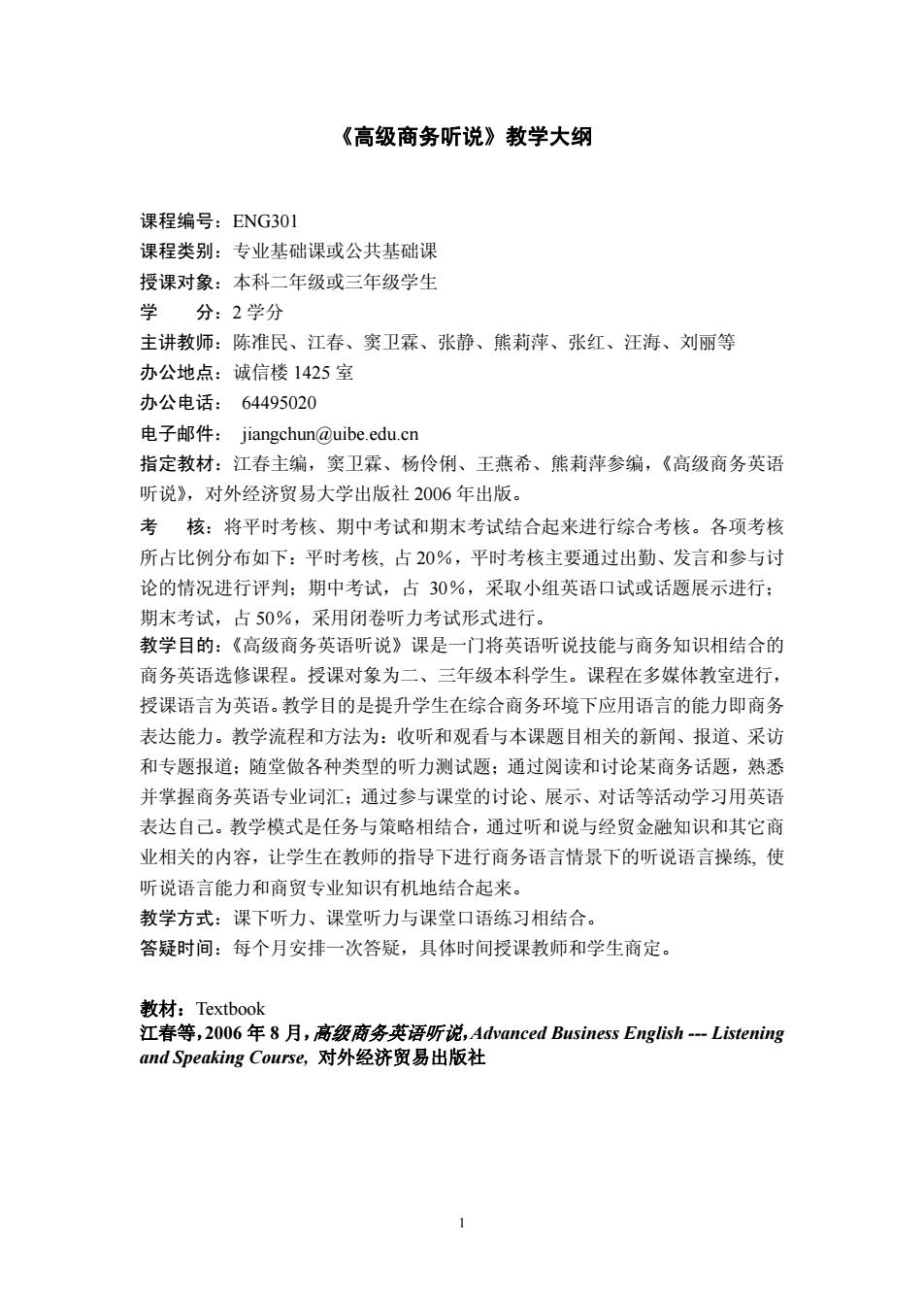
《高级商务听说》教学大纲 课程编号:ENG301 课程类别:专业基础课或公共基础课 授课对象:本科二年级或三年级学生 学分:2学分 主讲教师:陈准民、江春、窦卫霖、张静、熊莉萍、张红、汪海、刘丽等 办公地点:诚信楼1425室 办公电话:64495020 电子邮件:jiangchun@uibe.edu.cn 指定教材:江春主编,窦卫霖、杨伶俐、王燕希、熊莉萍参编,《高级商务英语 听说》,对外经济贸易大学出版社2006年出版。 考核:将平时考核、期中考试和期末考试结合起来进行综合考核。各项考核 所占比例分布如下:平时考核,占20%,平时考核主要通过出勤、发言和参与讨 论的情况进行评判;期中考试,占30%,采取小组英语口试或话题展示进行: 期末考试,占50%,采用闭卷听力考试形式进行。 教学目的:《高级商务英语听说》课是一门将英语听说技能与商务知识相结合的 商务英语选修课程。授课对象为二、三年级本科学生。课程在多媒体教室进行, 授课语言为英语。教学目的是提升学生在综合商务环境下应用语言的能力即商务 表达能力。教学流程和方法为:收听和观看与本课题目相关的新闻、报道、采访 和专题报道:随堂做各种类型的听力测试题;通过阅读和讨论某商务话题,熟悉 并掌握商务英语专业词汇:通过参与课堂的讨论、展示、对话等活动学习用英语 表达自己。教学模式是任务与策略相结合,通过听和说与经贸金融知识和其它商 业相关的内容,让学生在教师的指导下进行商务语言情景下的听说语言操练,使 听说语言能力和商贸专业知识有机地结合起来。 教学方式:课下听力、课堂听力与课堂口语练习相结合。 答疑时间:每个月安排一次答疑,具体时间授课教师和学生商定。 教材:Textbook 江春等,2006年8月,高级商务英语听说,Advanced Business English--Listening and Speaking Course,,对外经济贸易出版社
《高级商务听说》教学大纲 课程编号:ENG301 课程类别:专业基础课或公共基础课 授课对象:本科二年级或三年级学生 学 分:2 学分 主讲教师:陈准民、江春、窦卫霖、张静、熊莉萍、张红、汪海、刘丽等 办公地点:诚信楼 1425 室 办公电话: 64495020 电子邮件: jiangchun@uibe.edu.cn 指定教材:江春主编,窦卫霖、杨伶俐、王燕希、熊莉萍参编,《高级商务英语 听说》,对外经济贸易大学出版社 2006 年出版。 考 核:将平时考核、期中考试和期末考试结合起来进行综合考核。各项考核 所占比例分布如下:平时考核, 占 20%,平时考核主要通过出勤、发言和参与讨 论的情况进行评判;期中考试,占 30%,采取小组英语口试或话题展示进行; 期末考试,占 50%,采用闭卷听力考试形式进行。 教学目的:《高级商务英语听说》课是一门将英语听说技能与商务知识相结合的 商务英语选修课程。授课对象为二、三年级本科学生。课程在多媒体教室进行, 授课语言为英语。教学目的是提升学生在综合商务环境下应用语言的能力即商务 表达能力。教学流程和方法为:收听和观看与本课题目相关的新闻、报道、采访 和专题报道;随堂做各种类型的听力测试题;通过阅读和讨论某商务话题,熟悉 并掌握商务英语专业词汇;通过参与课堂的讨论、展示、对话等活动学习用英语 表达自己。教学模式是任务与策略相结合,通过听和说与经贸金融知识和其它商 业相关的内容,让学生在教师的指导下进行商务语言情景下的听说语言操练, 使 听说语言能力和商贸专业知识有机地结合起来。 教学方式:课下听力、课堂听力与课堂口语练习相结合。 答疑时间:每个月安排一次答疑,具体时间授课教师和学生商定。 教材:Textbook 江春等,2006 年 8 月,高级商务英语听说,Advanced Business English --- Listening and Speaking Course, 对外经济贸易出版社 1
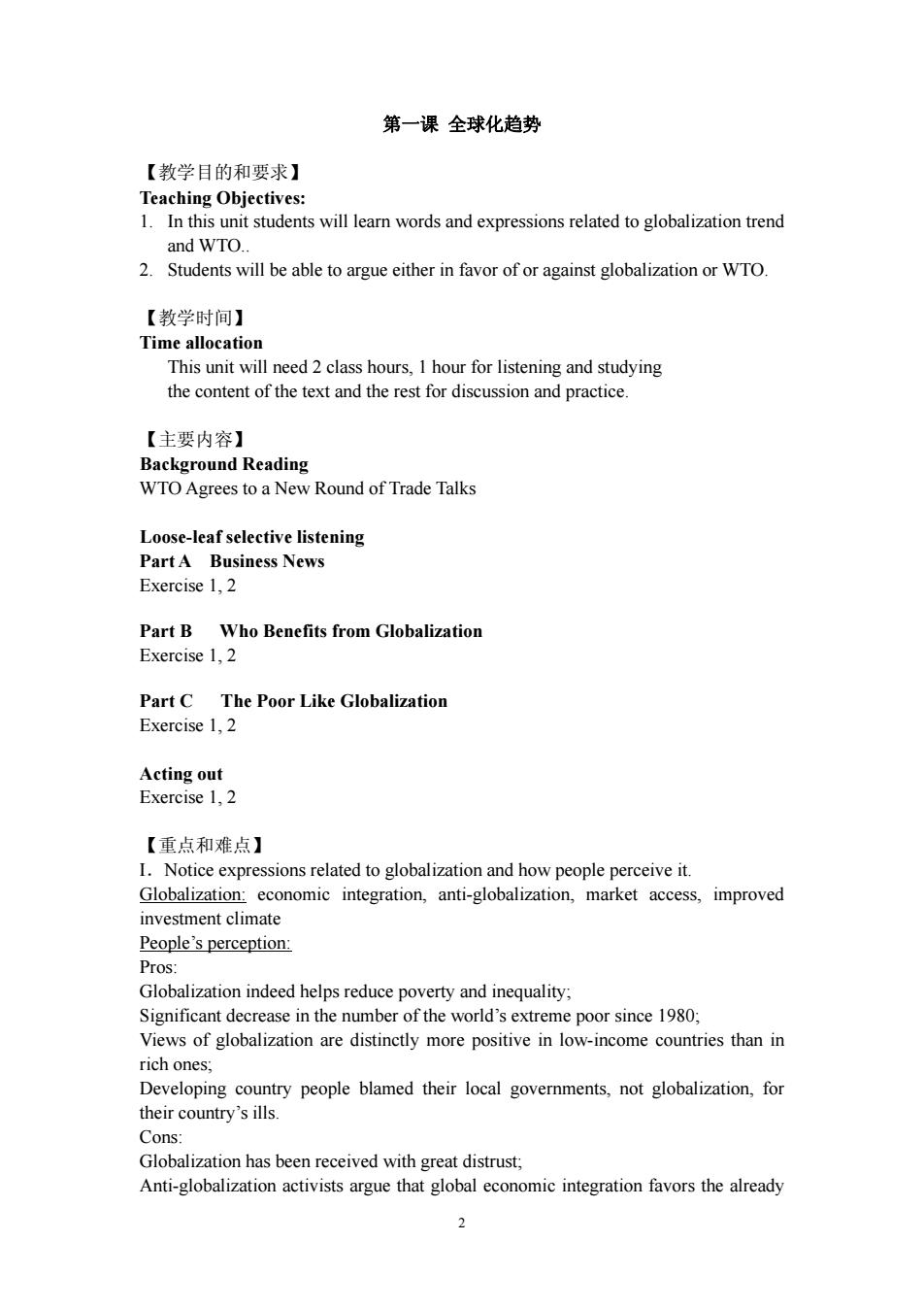
第一课全球化趋势 【教学目的和要求】 Teaching Objectives: 1.In this unit students will learn words and expressions related to globalization trend and WTO. 2.Students will be able to argue either in favor of or against globalization or WTO. 【教学时间】 Time allocation This unit will need 2 class hours,I hour for listening and studying the content of the text and the rest for discussion and practice. 【主要内容】 Background Reading WTO Agrees to a New Round of Trade Talks Loose-leaf selective listening Part A Business News Exercise 1,2 Part B Who Benefits from Globalization Exercise 1,2 Part C The Poor Like Globalization Exercise 1,2 Acting out Exercise 1,2 【重点和难点】 I.Notice expressions related to globalization and how people perceive it. Globalization:economic integration,anti-globalization,market access,improved investment climate People's perception: Pros: Globalization indeed helps reduce poverty and inequality; Significant decrease in the number of the world's extreme poor since 1980; Views of globalization are distinctly more positive in low-income countries than in rich ones; Developing country people blamed their local governments,not globalization,for their country's ills. Cons: Globalization has been received with great distrust; Anti-globalization activists argue that global economic integration favors the already 2
第一课 全球化趋势 【教学目的和要求】 Teaching Objectives: 1. In this unit students will learn words and expressions related to globalization trend and WTO.. 2. Students will be able to argue either in favor of or against globalization or WTO. 【教学时间】 Time allocation This unit will need 2 class hours, 1 hour for listening and studying the content of the text and the rest for discussion and practice. 【主要内容】 Background Reading WTO Agrees to a New Round of Trade Talks Loose-leaf selective listening Part A Business News Exercise 1, 2 Part B Who Benefits from Globalization Exercise 1, 2 Part C The Poor Like Globalization Exercise 1, 2 Acting out Exercise 1, 2 【重点和难点】 I.Notice expressions related to globalization and how people perceive it. Globalization: economic integration, anti-globalization, market access, improved investment climate People’s perception: Pros: Globalization indeed helps reduce poverty and inequality; Significant decrease in the number of the world’s extreme poor since 1980; Views of globalization are distinctly more positive in low-income countries than in rich ones; Developing country people blamed their local governments, not globalization, for their country’s ills. Cons: Globalization has been received with great distrust; Anti-globalization activists argue that global economic integration favors the already 2
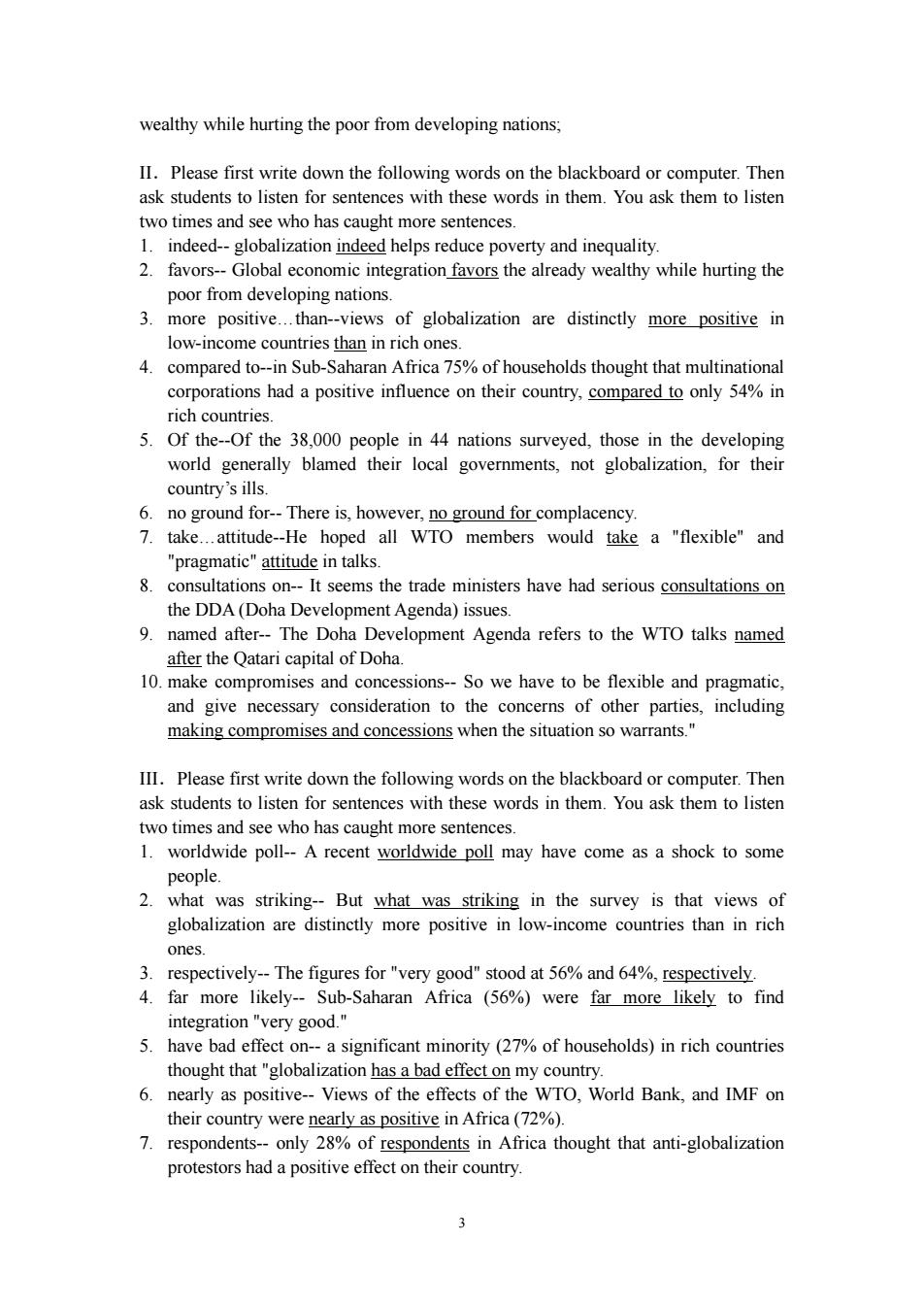
wealthy while hurting the poor from developing nations; II.Please first write down the following words on the blackboard or computer.Then ask students to listen for sentences with these words in them.You ask them to listen two times and see who has caught more sentences. 1.indeed--globalization indeed helps reduce poverty and inequality 2.favors--Global economic integration favors the already wealthy while hurting the poor from developing nations. 3.more positive...than--views of globalization are distinctly more positive in low-income countries than in rich ones. 4.compared to--in Sub-Saharan Africa 75%of households thought that multinational corporations had a positive influence on their country,compared to only 54%in rich countries. 5.Of the--Of the 38,000 people in 44 nations surveyed,those in the developing world generally blamed their local governments,not globalization,for their country's ills. 6.no ground for--There is,however,no ground for complacency. 7.take...attitude--He hoped all WTO members would take a "flexible"and "pragmatic"attitude in talks. 8.consultations on--It seems the trade ministers have had serious consultations on the DDA(Doha Development Agenda)issues. 9.named after--The Doha Development Agenda refers to the WTO talks named after the Qatari capital of Doha. 10.make compromises and concessions--So we have to be flexible and pragmatic, and give necessary consideration to the concerns of other parties,including making compromises and concessions when the situation so warrants." III.Please first write down the following words on the blackboard or computer.Then ask students to listen for sentences with these words in them.You ask them to listen two times and see who has caught more sentences. 1.worldwide poll--A recent worldwide poll may have come as a shock to some people. 2.what was striking--But what was striking in the survey is that views of globalization are distinctly more positive in low-income countries than in rich ones. 3.respectively--The figures for "very good"stood at 56%and 64%,respectively. 4.far more likely--Sub-Saharan Africa (56%)were far more likely to find integration "very good." 5.have bad effect on--a significant minority (27%of households)in rich countries thought that "globalization has a bad effect on my country. 6.nearly as positive--Views of the effects of the WTO,World Bank,and IMF on their country were nearly as positive in Africa(72%). 7.respondents--only 28%of respondents in Africa thought that anti-globalization protestors had a positive effect on their country
wealthy while hurting the poor from developing nations; II.Please first write down the following words on the blackboard or computer. Then ask students to listen for sentences with these words in them. You ask them to listen two times and see who has caught more sentences. 1. indeed-- globalization indeed helps reduce poverty and inequality. 2. favors-- Global economic integration favors the already wealthy while hurting the poor from developing nations. 3. more positive…than--views of globalization are distinctly more positive in low-income countries than in rich ones. 4. compared to--in Sub-Saharan Africa 75% of households thought that multinational corporations had a positive influence on their country, compared to only 54% in rich countries. 5. Of the--Of the 38,000 people in 44 nations surveyed, those in the developing world generally blamed their local governments, not globalization, for their country’s ills. 6. no ground for-- There is, however, no ground for complacency. 7. take…attitude--He hoped all WTO members would take a "flexible" and "pragmatic" attitude in talks. 8. consultations on-- It seems the trade ministers have had serious consultations on the DDA (Doha Development Agenda) issues. 9. named after-- The Doha Development Agenda refers to the WTO talks named after the Qatari capital of Doha. 10. make compromises and concessions-- So we have to be flexible and pragmatic, and give necessary consideration to the concerns of other parties, including making compromises and concessions when the situation so warrants." III.Please first write down the following words on the blackboard or computer. Then ask students to listen for sentences with these words in them. You ask them to listen two times and see who has caught more sentences. 1. worldwide poll-- A recent worldwide poll may have come as a shock to some people. 2. what was striking-- But what was striking in the survey is that views of globalization are distinctly more positive in low-income countries than in rich ones. 3. respectively-- The figures for "very good" stood at 56% and 64%, respectively. 4. far more likely-- Sub-Saharan Africa (56%) were far more likely to find integration "very good." 5. have bad effect on-- a significant minority (27% of households) in rich countries thought that "globalization has a bad effect on my country. 6. nearly as positive-- Views of the effects of the WTO, World Bank, and IMF on their country were nearly as positive in Africa (72%). 7. respondents-- only 28% of respondents in Africa thought that anti-globalization protestors had a positive effect on their country. 3
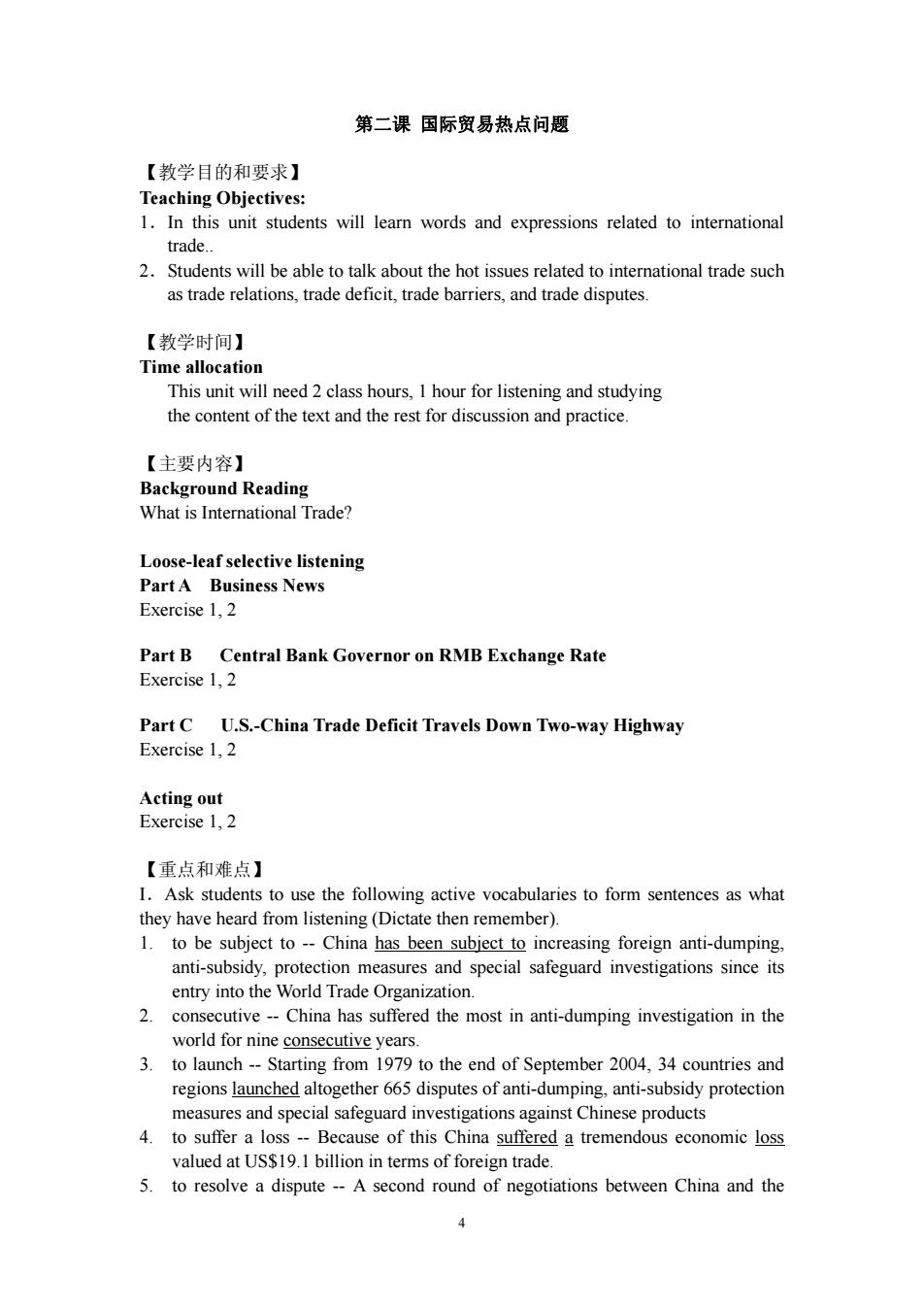
第二课国际贸易热点问题 【教学目的和要求】 Teaching Objectives: 1.In this unit students will learn words and expressions related to international trade.. 2.Students will be able to talk about the hot issues related to international trade such as trade relations,trade deficit,trade barriers,and trade disputes. 【教学时间】 Time allocation This unit will need 2 class hours,1 hour for listening and studying the content of the text and the rest for discussion and practice. 【主要内容】 Background Reading What is International Trade? Loose-leaf selective listening Part A Business News Exercise 1,2 Part B Central Bank Governor on RMB Exchange Rate Exercise 1,2 Part C U.S.-China Trade Deficit Travels Down Two-way Highway Exercise 1,2 Acting out Exercise 1,2 【重点和难点】 I.Ask students to use the following active vocabularies to form sentences as what they have heard from listening(Dictate then remember). 1.to be subject to--China has been subject to increasing foreign anti-dumping, anti-subsidy,protection measures and special safeguard investigations since its entry into the World Trade Organization. 2. consecutive--China has suffered the most in anti-dumping investigation in the world for nine consecutive years. 3.to launch--Starting from 1979 to the end of September 2004,34 countries and regions launched altogether 665 disputes of anti-dumping,anti-subsidy protection measures and special safeguard investigations against Chinese products 4.to suffer a loss --Because of this China suffered a tremendous economic loss valued at US$19.1 billion in terms of foreign trade. 5.to resolve a dispute --A second round of negotiations between China and the
第二课 国际贸易热点问题 【教学目的和要求】 Teaching Objectives: 1.In this unit students will learn words and expressions related to international trade.. 2.Students will be able to talk about the hot issues related to international trade such as trade relations, trade deficit, trade barriers, and trade disputes. 【教学时间】 Time allocation This unit will need 2 class hours, 1 hour for listening and studying the content of the text and the rest for discussion and practice. 【主要内容】 Background Reading What is International Trade? Loose-leaf selective listening Part A Business News Exercise 1, 2 Part B Central Bank Governor on RMB Exchange Rate Exercise 1, 2 Part C U.S.-China Trade Deficit Travels Down Two-way Highway Exercise 1, 2 Acting out Exercise 1, 2 【重点和难点】 I.Ask students to use the following active vocabularies to form sentences as what they have heard from listening (Dictate then remember). 1. to be subject to -- China has been subject to increasing foreign anti-dumping, anti-subsidy, protection measures and special safeguard investigations since its entry into the World Trade Organization. 2. consecutive -- China has suffered the most in anti-dumping investigation in the world for nine consecutive years. 3. to launch -- Starting from 1979 to the end of September 2004, 34 countries and regions launched altogether 665 disputes of anti-dumping, anti-subsidy protection measures and special safeguard investigations against Chinese products 4. to suffer a loss -- Because of this China suffered a tremendous economic loss valued at US$19.1 billion in terms of foreign trade. 5. to resolve a dispute -- A second round of negotiations between China and the 4
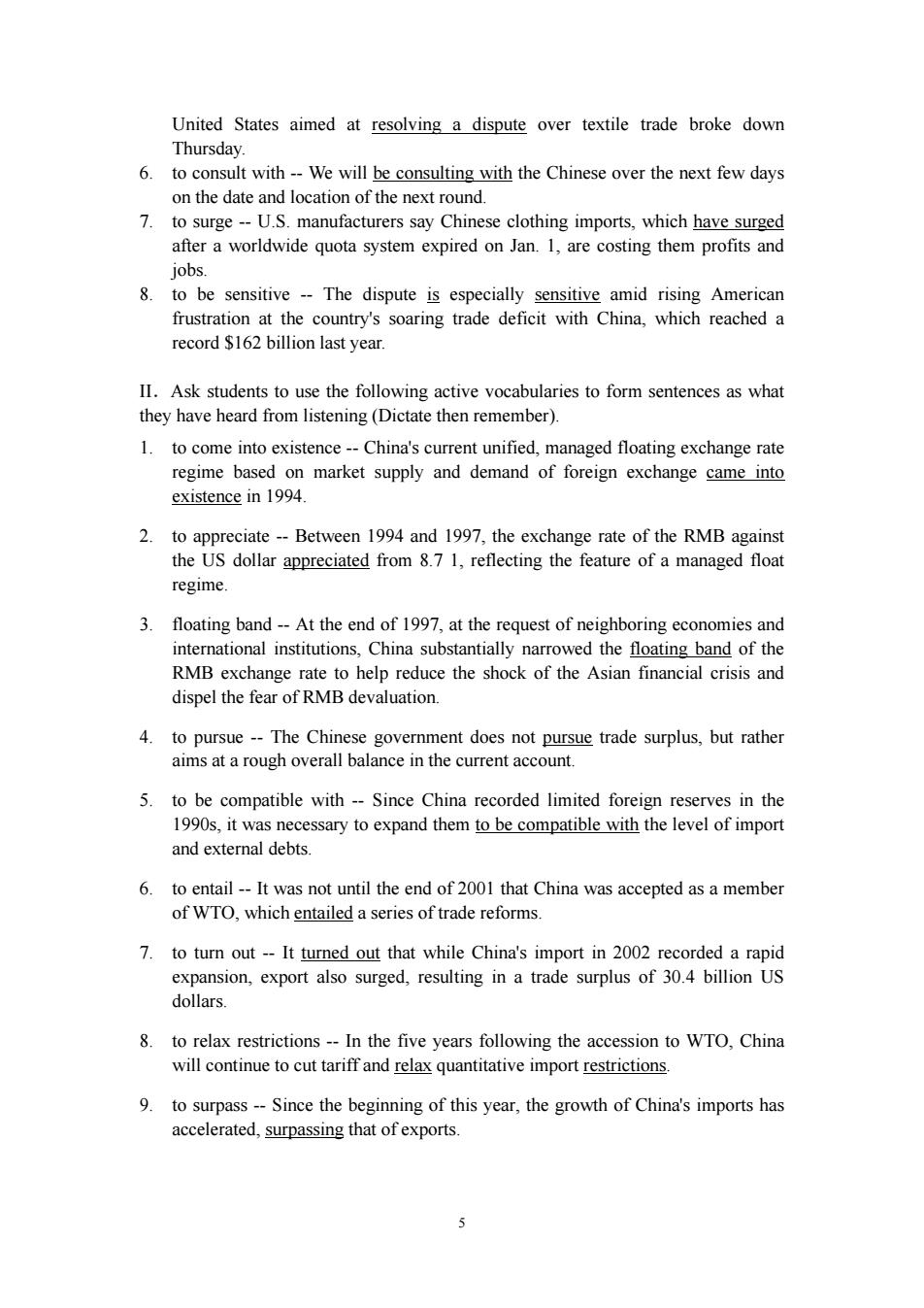
United States aimed at resolving a dispute over textile trade broke down Thursday. 6.to consult with--We will be consulting with the Chinese over the next few days on the date and location of the next round. 7.to surge--U.S.manufacturers say Chinese clothing imports,which have surged after a worldwide quota system expired on Jan.1,are costing them profits and jobs. 8.to be sensitive --The dispute is especially sensitive amid rising American frustration at the country's soaring trade deficit with China,which reached a record $162 billion last year. II.Ask students to use the following active vocabularies to form sentences as what they have heard from listening(Dictate then remember). 1.to come into existence--China's current unified,managed floating exchange rate regime based on market supply and demand of foreign exchange came into existence in 1994. 2.to appreciate--Between 1994 and 1997,the exchange rate of the RMB against the US dollar appreciated from 8.7 1,reflecting the feature of a managed float regime 3.floating band--At the end of 1997,at the request of neighboring economies and international institutions,China substantially narrowed the floating band of the RMB exchange rate to help reduce the shock of the Asian financial crisis and dispel the fear of RMB devaluation. 4.to pursue--The Chinese government does not pursue trade surplus,but rather aims at a rough overall balance in the current account. 5.to be compatible with--Since China recorded limited foreign reserves in the 1990s,it was necessary to expand them to be compatible with the level of import and external debts. 6.to entail--It was not until the end of 2001 that China was accepted as a member of WTO,which entailed a series of trade reforms. 7.to turn out--It turned out that while China's import in 2002 recorded a rapid expansion,export also surged,resulting in a trade surplus of 30.4 billion US dollars. 8.to relax restrictions--In the five years following the accession to WTO,China will continue to cut tariff and relax quantitative import restrictions. 9.to surpass--Since the beginning of this year,the growth of China's imports has accelerated,surpassing that of exports
United States aimed at resolving a dispute over textile trade broke down Thursday. 6. to consult with -- We will be consulting with the Chinese over the next few days on the date and location of the next round. 7. to surge -- U.S. manufacturers say Chinese clothing imports, which have surged after a worldwide quota system expired on Jan. 1, are costing them profits and jobs. 8. to be sensitive -- The dispute is especially sensitive amid rising American frustration at the country's soaring trade deficit with China, which reached a record $162 billion last year. II.Ask students to use the following active vocabularies to form sentences as what they have heard from listening (Dictate then remember). 1. to come into existence -- China's current unified, managed floating exchange rate regime based on market supply and demand of foreign exchange came into existence in 1994. 2. to appreciate -- Between 1994 and 1997, the exchange rate of the RMB against the US dollar appreciated from 8.7 1, reflecting the feature of a managed float regime. 3. floating band -- At the end of 1997, at the request of neighboring economies and international institutions, China substantially narrowed the floating band of the RMB exchange rate to help reduce the shock of the Asian financial crisis and dispel the fear of RMB devaluation. 4. to pursue -- The Chinese government does not pursue trade surplus, but rather aims at a rough overall balance in the current account. 5. to be compatible with -- Since China recorded limited foreign reserves in the 1990s, it was necessary to expand them to be compatible with the level of import and external debts. 6. to entail -- It was not until the end of 2001 that China was accepted as a member of WTO, which entailed a series of trade reforms. 7. to turn out -- It turned out that while China's import in 2002 recorded a rapid expansion, export also surged, resulting in a trade surplus of 30.4 billion US dollars. 8. to relax restrictions -- In the five years following the accession to WTO, China will continue to cut tariff and relax quantitative import restrictions. 9. to surpass -- Since the beginning of this year, the growth of China's imports has accelerated, surpassing that of exports. 5

10.to call for--International trade theories and WTO spirit call for multilateral-trade balance rather than bilateral trade balance. 11.given--Given the two countries'existing economic and trade structure,the United States would continue to have big trade deficit with China. 12.to be attributable to --The US trade deficit may be attributable to structural imbalances and fiscal deficits in the United States rather than the RMB exchange rate III.Ask students to use the following active vocabularies to form sentences as what they have heard from listening(Dictate then remember). 1.to edge--When China finally allowed its currency to edge higher against the dollar last week,many U.S.manufacturers and policymakers countered that the increase was too small to dent the soaring U.S.trade deficit with China. 2.to scrap--With protectionist sentiment mounting on Capitol Hill in recent months,Beijing scrapped a decade-old policy of pegging the renminbi,or yuan, to the dollar. 3.to slap--Why not retaliate by slapping duties on Chinese imports,as Congress has threatened to do? 4.to fuel--China's economic boom is fueled by the huge U.S.appetite for low-cost Chinese appliances,furniture,textiles --and components for the auto and other U.S.industries. 5.leverage--Washington has a lot of leverage over Beijing. 6.access to--China needs access to the U.S.market to create jobs and preserve stability--the No.1 priority in China. 6
10. to call for -- International trade theories and WTO spirit call for multilateral-trade balance rather than bilateral trade balance. 11. given -- Given the two countries' existing economic and trade structure, the United States would continue to have big trade deficit with China. 12. to be attributable to -- The US trade deficit may be attributable to structural imbalances and fiscal deficits in the United States rather than the RMB exchange rate. III.Ask students to use the following active vocabularies to form sentences as what they have heard from listening (Dictate then remember). 1. to edge -- When China finally allowed its currency to edge higher against the dollar last week, many U.S. manufacturers and policymakers countered that the increase was too small to dent the soaring U.S. trade deficit with China. 2. to scrap -- With protectionist sentiment mounting on Capitol Hill in recent months, Beijing scrapped a decade-old policy of pegging the renminbi, or yuan, to the dollar. 3. to slap -- Why not retaliate by slapping duties on Chinese imports, as Congress has threatened to do? 4. to fuel -- China's economic boom is fueled by the huge U.S. appetite for low-cost Chinese appliances, furniture, textiles -- and components for the auto and other U.S. industries. 5. leverage -- Washington has a lot of leverage over Beijing. 6. access to -- China needs access to the U.S. market to create jobs and preserve stability -- the No. 1 priority in China. 6
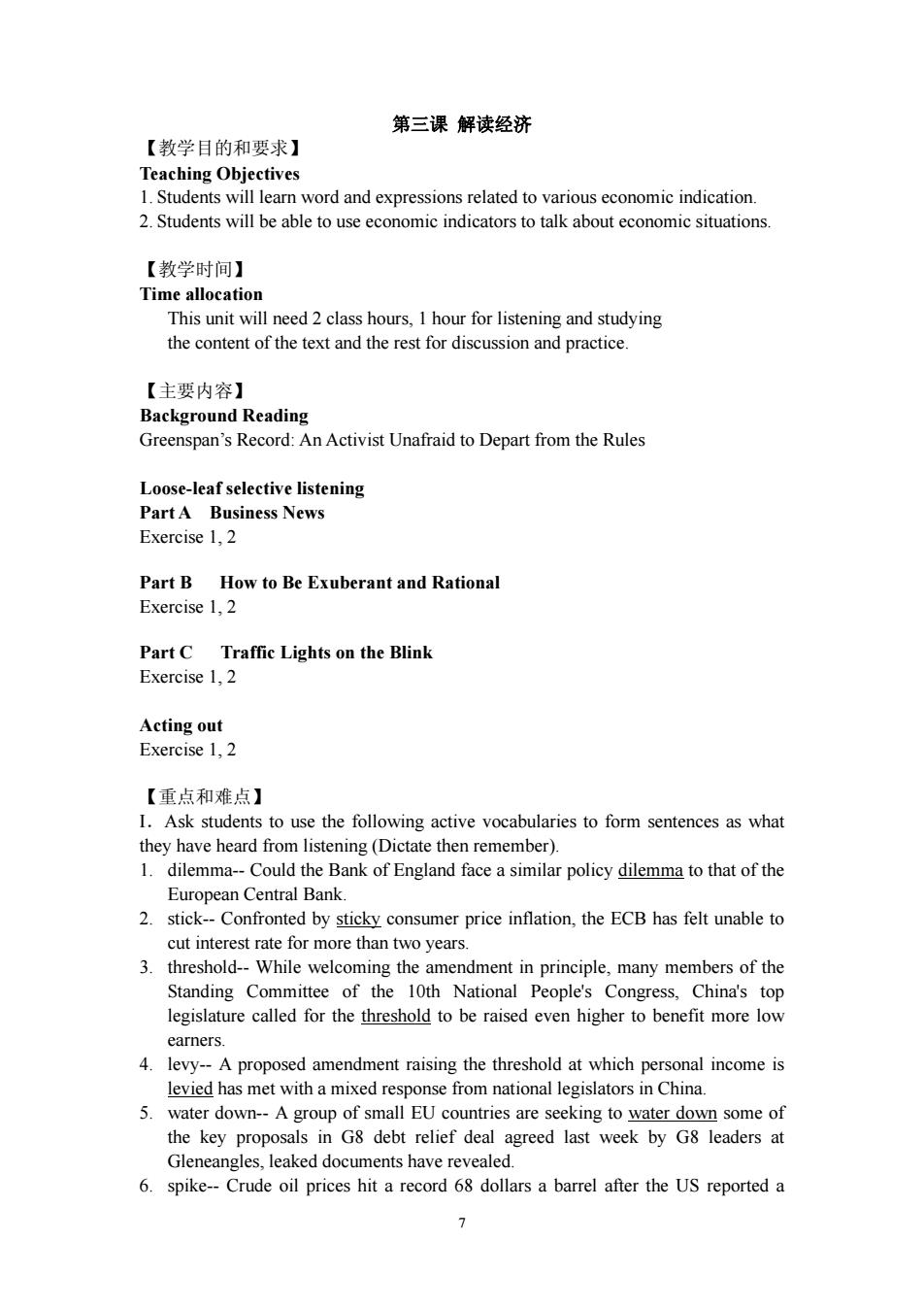
第三课解读经济 【教学目的和要求】 Teaching Objectives 1.Students will learn word and expressions related to various economic indication. 2.Students will be able to use economic indicators to talk about economic situations. 【教学时间】 Time allocation This unit will need 2 class hours,1 hour for listening and studying the content of the text and the rest for discussion and practice. 【主要内容】 Background Reading Greenspan's Record:An Activist Unafraid to Depart from the Rules Loose-leaf selective listening Part A Business News Exercise 1,2 Part B How to Be Exuberant and Rational Exercise 1,2 Part C Traffic Lights on the Blink Exercise 1,2 Acting out Exercise 1,2 【重点和难点】 I.Ask students to use the following active vocabularies to form sentences as what they have heard from listening(Dictate then remember). 1.dilemma--Could the Bank of England face a similar policy dilemma to that of the European Central Bank. 2.stick--Confronted by sticky consumer price inflation,the ECB has felt unable to cut interest rate for more than two years. 3.threshold--While welcoming the amendment in principle,many members of the Standing Committee of the 10th National People's Congress,China's top legislature called for the threshold to be raised even higher to benefit more low earners. 4.levy--A proposed amendment raising the threshold at which personal income is levied has met with a mixed response from national legislators in China. 5.water down--A group of small EU countries are seeking to water down some of the key proposals in G8 debt relief deal agreed last week by G8 leaders at Gleneangles,leaked documents have revealed. 6.spike--Crude oil prices hit a record 68 dollars a barrel after the US reported a
第三课 解读经济 【教学目的和要求】 Teaching Objectives 1. Students will learn word and expressions related to various economic indication. 2. Students will be able to use economic indicators to talk about economic situations. 【教学时间】 Time allocation This unit will need 2 class hours, 1 hour for listening and studying the content of the text and the rest for discussion and practice. 【主要内容】 Background Reading Greenspan’s Record: An Activist Unafraid to Depart from the Rules Loose-leaf selective listening Part A Business News Exercise 1, 2 Part B How to Be Exuberant and Rational Exercise 1, 2 Part C Traffic Lights on the Blink Exercise 1, 2 Acting out Exercise 1, 2 【重点和难点】 I.Ask students to use the following active vocabularies to form sentences as what they have heard from listening (Dictate then remember). 1. dilemma-- Could the Bank of England face a similar policy dilemma to that of the European Central Bank. 2. stick-- Confronted by sticky consumer price inflation, the ECB has felt unable to cut interest rate for more than two years. 3. threshold-- While welcoming the amendment in principle, many members of the Standing Committee of the 10th National People's Congress, China's top legislature called for the threshold to be raised even higher to benefit more low earners. 4. levy-- A proposed amendment raising the threshold at which personal income is levied has met with a mixed response from national legislators in China. 5. water down-- A group of small EU countries are seeking to water down some of the key proposals in G8 debt relief deal agreed last week by G8 leaders at Gleneangles, leaked documents have revealed. 6. spike-- Crude oil prices hit a record 68 dollars a barrel after the US reported a 7
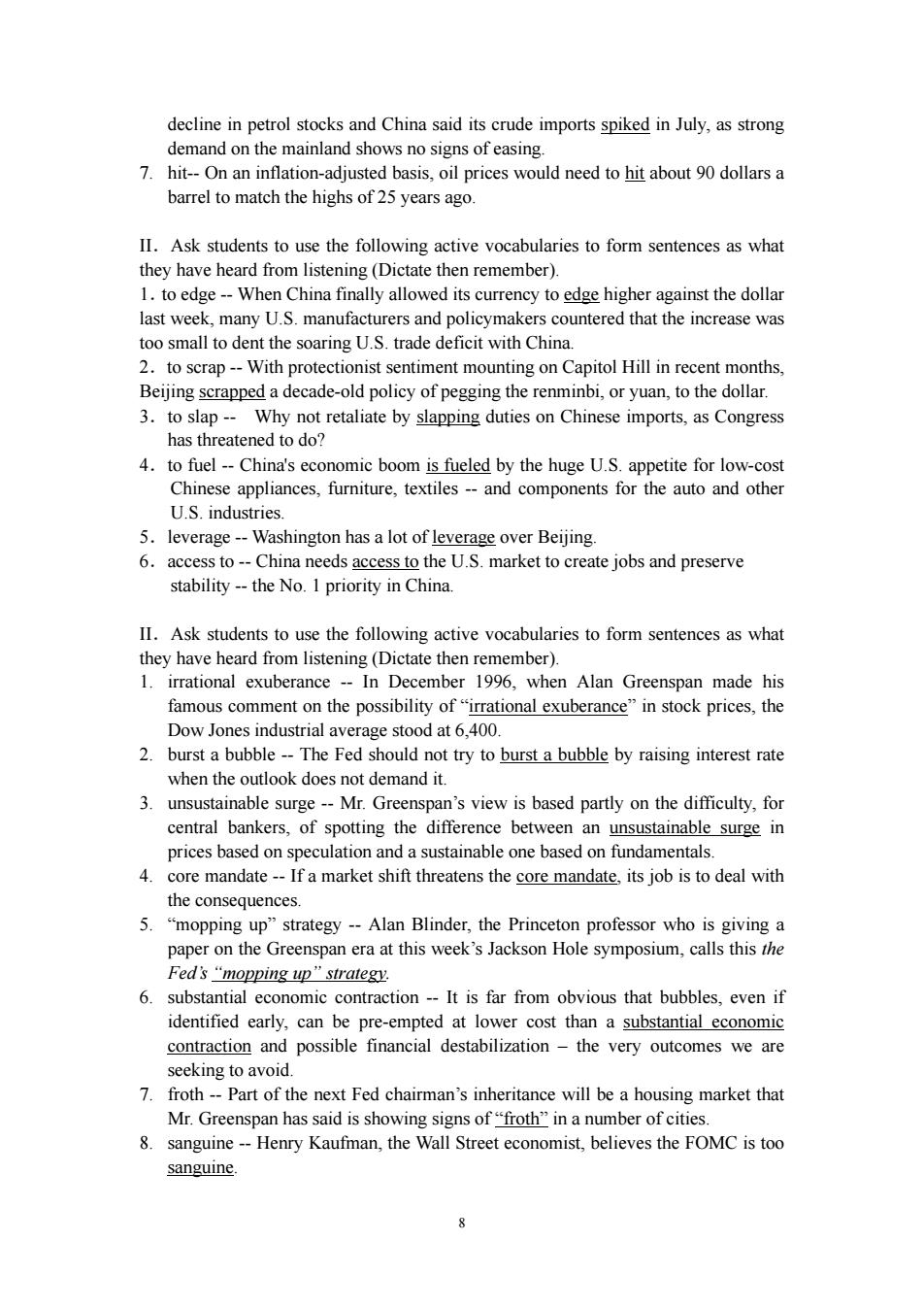
decline in petrol stocks and China said its crude imports spiked in July,as strong demand on the mainland shows no signs of easing. 7.hit--On an inflation-adjusted basis,oil prices would need to hit about 90 dollars a barrel to match the highs of 25 years ago. II.Ask students to use the following active vocabularies to form sentences as what they have heard from listening(Dictate then remember). 1.to edge--When China finally allowed its currency to edge higher against the dollar last week,many U.S.manufacturers and policymakers countered that the increase was too small to dent the soaring U.S.trade deficit with China. 2.to scrap--With protectionist sentiment mounting on Capitol Hill in recent months, Beijing scrapped a decade-old policy of pegging the renminbi,or yuan,to the dollar. 3.to slap--Why not retaliate by slapping duties on Chinese imports,as Congress has threatened to do? 4.to fuel--China's economic boom is fueled by the huge U.S.appetite for low-cost Chinese appliances,furniture,textiles--and components for the auto and other U.S.industries. 5.leverage--Washington has a lot of leverage over Beijing. 6.access to--China needs access to the U.S.market to create jobs and preserve stability--the No.1 priority in China. II.Ask students to use the following active vocabularies to form sentences as what they have heard from listening(Dictate then remember). 1.irrational exuberance --In December 1996,when Alan Greenspan made his famous comment on the possibility of "irrational exuberance"in stock prices,the Dow Jones industrial average stood at 6,400. 2.burst a bubble--The Fed should not try to burst a bubble by raising interest rate when the outlook does not demand it. 3.unsustainable surge--Mr.Greenspan's view is based partly on the difficulty,for central bankers,of spotting the difference between an unsustainable surge in prices based on speculation and a sustainable one based on fundamentals. 4.core mandate--If a market shift threatens the core mandate,its job is to deal with the consequences. 5."mopping up"strategy--Alan Blinder,the Princeton professor who is giving a paper on the Greenspan era at this week's Jackson Hole symposium,calls this the Fed3“nopping up”strategy. 6.substantial economic contraction--It is far from obvious that bubbles,even if identified early,can be pre-empted at lower cost than a substantial economic contraction and possible financial destabilization-the very outcomes we are seeking to avoid. 7.froth--Part of the next Fed chairman's inheritance will be a housing market that Mr.Greenspan has said is showing signs of"froth"in a number of cities. 8.sanguine--Henry Kaufman,the Wall Street economist,believes the FOMC is too sanguine
decline in petrol stocks and China said its crude imports spiked in July, as strong demand on the mainland shows no signs of easing. 7. hit-- On an inflation-adjusted basis, oil prices would need to hit about 90 dollars a barrel to match the highs of 25 years ago. II.Ask students to use the following active vocabularies to form sentences as what they have heard from listening (Dictate then remember). 1.to edge -- When China finally allowed its currency to edge higher against the dollar last week, many U.S. manufacturers and policymakers countered that the increase was too small to dent the soaring U.S. trade deficit with China. 2.to scrap -- With protectionist sentiment mounting on Capitol Hill in recent months, Beijing scrapped a decade-old policy of pegging the renminbi, or yuan, to the dollar. 3.to slap -- Why not retaliate by slapping duties on Chinese imports, as Congress has threatened to do? 4.to fuel -- China's economic boom is fueled by the huge U.S. appetite for low-cost Chinese appliances, furniture, textiles -- and components for the auto and other U.S. industries. 5.leverage -- Washington has a lot of leverage over Beijing. 6.access to -- China needs access to the U.S. market to create jobs and preserve stability -- the No. 1 priority in China. II.Ask students to use the following active vocabularies to form sentences as what they have heard from listening (Dictate then remember). 1. irrational exuberance -- In December 1996, when Alan Greenspan made his famous comment on the possibility of “irrational exuberance” in stock prices, the Dow Jones industrial average stood at 6,400. 2. burst a bubble -- The Fed should not try to burst a bubble by raising interest rate when the outlook does not demand it. 3. unsustainable surge -- Mr. Greenspan’s view is based partly on the difficulty, for central bankers, of spotting the difference between an unsustainable surge in prices based on speculation and a sustainable one based on fundamentals. 4. core mandate -- If a market shift threatens the core mandate, its job is to deal with the consequences. 5. “mopping up” strategy -- Alan Blinder, the Princeton professor who is giving a paper on the Greenspan era at this week’s Jackson Hole symposium, calls this the Fed’s “mopping up” strategy. 6. substantial economic contraction -- It is far from obvious that bubbles, even if identified early, can be pre-empted at lower cost than a substantial economic contraction and possible financial destabilization – the very outcomes we are seeking to avoid. 7. froth -- Part of the next Fed chairman’s inheritance will be a housing market that Mr. Greenspan has said is showing signs of “froth” in a number of cities. 8. sanguine -- Henry Kaufman, the Wall Street economist, believes the FOMC is too sanguine. 8

9.consumption binge--The Fed's assurances that it will raise rates at a"measured" pace have contributed to a household debt-financed consumption binge and to speculative activity by investors. III.Ask students to use the following active vocabularies to form sentences as what they have heard from listening (Dictate then remember). 1.record surpluses--America's current-account deficit is forecast to widen to over $800 billion this year,while Germany,Japan and China look set to run record surpluses. 2.underlying structural factors--Many economists try to explain these trends in terms of underlying structural factors,such as differences in demographic trends or productivity growth. 3.demographic trends--Many economists try to explain these trends in terms of underlying structural factors,such as differences in demographic trends or productivity growth. 4.dearer--Dearer money then helps to dampen domestic spending and thus trim the external deficit. 5.dampen--Dearer money then helps to dampen domestic spending and thus trim the external deficit. 6.trim--Dearer money then helps to dampen domestic spending and thus trim the external deficit. 7.cooling--Real bond yields rose,cooling domestic demand. 8.jam--This time,however,the adjustment mechanism has jammed. 9.equilibrating force--Patrick Artus,chief economist at IXIS,a French investment bank,points to the disappearance of another equilibrating force that would normally help to correct financial imbalances. 10.curb--In the past,a rapid rise in consumer borrowing and spending would cause a central bank to push up interest rates to curb inflation. 11.anchor--Inflationary expectations are well anchored thanks to the credibility of central banks. 12.service--As a result,central banks have been able to hold interest rates below the growth in nominal GDP(the income from which debts must be serviced)for a prolonged period. 13.broken circuit--A third broken circuit is that between interest rates and growth 14.sluggish--Sluggish economies with low inflation require lower real interest rates than economic sprinters 15.sprinters--Sluggish economies with low inflation require lower real interest rates than economic sprinters. 16.arguably --Yields are arguably too low for America,but too high for Germany and Japan,causing the growth gap to persist. 9
9. consumption binge -- The Fed’s assurances that it will raise rates at a “measured” pace have contributed to a household debt-financed consumption binge and to speculative activity by investors. III.Ask students to use the following active vocabularies to form sentences as what they have heard from listening (Dictate then remember). 1. record surpluses -- America's current-account deficit is forecast to widen to over $800 billion this year, while Germany, Japan and China look set to run record surpluses. 2. underlying structural factors -- Many economists try to explain these trends in terms of underlying structural factors, such as differences in demographic trends or productivity growth. 3. demographic trends -- Many economists try to explain these trends in terms of underlying structural factors, such as differences in demographic trends or productivity growth. 4. dearer -- Dearer money then helps to dampen domestic spending and thus trim the external deficit. 5. dampen -- Dearer money then helps to dampen domestic spending and thus trim the external deficit. 6. trim -- Dearer money then helps to dampen domestic spending and thus trim the external deficit. 7. cooling -- Real bond yields rose, cooling domestic demand. 8. jam -- This time, however, the adjustment mechanism has jammed. 9. equilibrating force -- Patrick Artus, chief economist at IXIS, a French investment bank, points to the disappearance of another equilibrating force that would normally help to correct financial imbalances. 10. curb -- In the past, a rapid rise in consumer borrowing and spending would cause a central bank to push up interest rates to curb inflation. 11. anchor -- Inflationary expectations are well anchored thanks to the credibility of central banks. 12. service -- As a result, central banks have been able to hold interest rates below the growth in nominal GDP (the income from which debts must be serviced) for a prolonged period. 13. broken circuit -- A third broken circuit is that between interest rates and growth 14. sluggish -- Sluggish economies with low inflation require lower real interest rates than economic sprinters 15. sprinters -- Sluggish economies with low inflation require lower real interest rates than economic sprinters. 16. arguably -- Yields are arguably too low for America, but too high for Germany and Japan, causing the growth gap to persist. . 9

第四课消费者行为 【教学目的和要求】 Teaching Objectives: 1.Students should learn vocabulary and basic concepts related to marketing and consumer behavior. 2.Students will be able to talk about different consumer behavior and marketing practices 【教学时间】 Time allocation This unit will need 2 class hours,1 hour for listening and studying the content of the text and the rest for discussion and practice. 【主要内容】 Background Reading What is Consumer Behavior? Loose-leaf selective listening Part A Business News Exercise 1,2 Part B Diversified Americans Exercise 1,2 Part C Lifestyle Change-Fitness and Health Exercise 1,2 Acting out Exercise 1,2 【重点和难点】 I.Ask students to use the following active vocabularies to form sentences as what they have heard from listening(Dictate then remember). 1.to contract--He has contracted the habit of talking to himself. 2.acute--an acute disease,an acute hospital 3.There is a shortage of acute beds in the hospitals because of the unexpected outbreak of SARS. 4.to take sth.for granted--I take it for granted that we should build new roads 5.trivial--He sometimes puts the trivial above the important. 6.to mislead sb.Into...--Her friendly attitude misled us into thinking that we could trust her. II.Ask students to use the following active vocabularies to form sentences as what they have heard from listening (Dictate then remember). 10
第四课 消费者行为 【教学目的和要求】 Teaching Objectives: 1.Students should learn vocabulary and basic concepts related to marketing and consumer behavior. 2.Students will be able to talk about different consumer behavior and marketing practices. 【教学时间】 Time allocation This unit will need 2 class hours, 1 hour for listening and studying the content of the text and the rest for discussion and practice. 【主要内容】 Background Reading What is Consumer Behavior? Loose-leaf selective listening Part A Business News Exercise 1, 2 Part B Diversified Americans Exercise 1, 2 Part C Lifestyle Change – Fitness and Health Exercise 1, 2 Acting out Exercise 1, 2 【重点和难点】 I.Ask students to use the following active vocabularies to form sentences as what they have heard from listening (Dictate then remember). 1.to contract--He has contracted the habit of talking to himself. 2.acute--an acute disease, an acute hospital 3.There is a shortage of acute beds in the hospitals because of the unexpected outbreak of SARS. 4.to take sth. for granted -- I take it for granted that we should build new roads. 5.trivial -- He sometimes puts the trivial above the important. 6.to mislead sb. Into...-- Her friendly attitude misled us into thinking that we could trust her. II.Ask students to use the following active vocabularies to form sentences as what they have heard from listening (Dictate then remember). 10